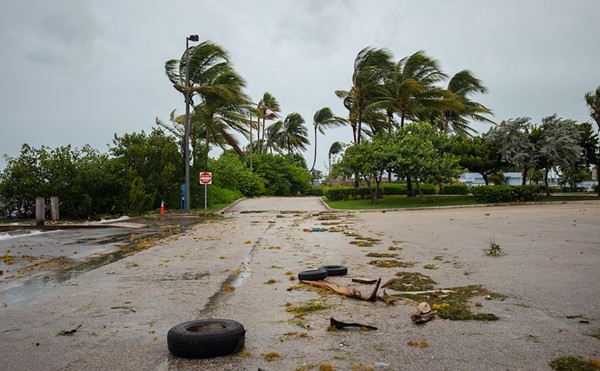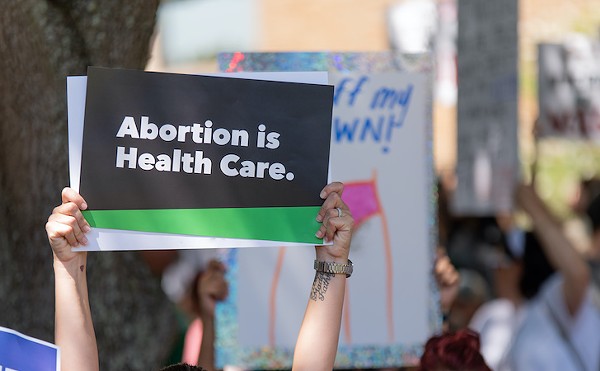;As the war in Iraq rages on, the number of American troop deaths continues to climb above 2,400. On top of that, more than 17,000 American troops have been wounded in the fight. Those are the numbers that are flashed on television screens and printed in newspapers. But what about those who return home with no outward wounds? For many veterans of the wars in Iraq and Afghanistan, the biggest scars are internal. Where do they go? In Central Florida, they go to the Orlando Vet Center.
;;;Years after the Vietnam War ended, veterans from the conflict were still experiencing readjustment problems. To help them, Congress passed legislation in 1979 that authorized the Veterans Administration to establish counseling programs for Vietnam vets. The counseling programs were subsequently extended to veterans of all conflicts from World War II to present.
;;There are 206 Vet Centers across the United States. The Secretary of Veterans Affairs recently procured funding for 100 new outreach technicians across the country (including one at the OVC), which has allowed the facilities to get the word out to more veterans about their services. The Orlando center serves eight counties in Central Florida, where, according to the OVC, approximately 300,000 veterans reside. Bill Sautner, the director of the Orlando clinic and one of the four counselors, served in the U.S. Marine Corps Reserves and has been with the OVC for 16 years. He sat down with Orlando Weekly to discuss the role of the Vet Center and what he's seeing in the veterans returning now.
;;Orlando Weekly: How has your role changed since the United States invaded Afghanistan?
;;Bill Sautner: Our role hasn't changed. We've always provided services to wartime veterans. The program was initially implemented to provide counseling to returning Vietnam veterans who had not otherwise used traditional VA services. Subsequent legislation extended it to all war-zone veterans of any era or any man or woman who has experienced sexual trauma [in the military].
;;OW: Have the numbers increased?
;;Sautner: Our numbers are up because of two things. We're seeing an increasing number of men and women from Iraq and Afghanistan. But we're also seeing veterans who are coming in from other war eras, whose memories are being awakened and stirred up by the presence of war and all that goes along with that in terms of media exposure. Some clients that had gone on to do well for themselves in the past are re-emerging and others that have never identified themselves as having any problems are coming in.
;;OW: Is it different for veterans of other wars who are coming in now as opposed to when they first came in?
;;Sautner: Sure, that was 26 years ago. The men that I was seeing in 1980 were young men. Now they're middle-aged men coming in at the end of careers, dealing with life-transition issues, and as a group they're a little bit calmer than they were back then.
;;OW: Is the trauma that vets might experience in war increased if they're fighting in what, according to the polls, is an unpopular war?
;;Sautner: I don't think the trauma changes, because largely the events and the stressors are the same. The trauma of being exposed to life-threatening events and seeing the results of explosive devices going off and being shot at, I think, cuts across all conflicts.
;;For Vietnam veterans, what made it difficult for them was the trauma of returning home to an unwelcome and unsympathetic society. I don't think for the veterans now that has emerged as an issue because largely the support has been there and will continue to be there. One of the things we learned in Vietnam is to separate out the war from the warrior, to honor the service even if you don't agree with the war.
;;OW: Still, when they're back in the United States, they hear the same poll numbers that everyone else does. Even if we've separated the war from the warrior, a majority of citizens believe we shouldn't be fighting the war these veterans are returning from. Does that affect their recovery?
;;Sautner: I think only time will tell that. Thus far I haven't seen any problems, because largely the men who are coming in here are reporting pretty positive homecomings. But that certainly can be a complicating factor.
;;OW: Are there any problems you're seeing that are specific to Iraq veterans?
;;Sautner: We're seeing the whole range of problems like readjustment issues, reintegration into their family, employment. And on the other end, we're seeing full-blown post-traumatic stress disorder and everything in between. We're treating all that. What we're seeing a lot of here, and I've heard this is true of a lot of vet centers I've spoken with, is that a lot of young men and women are coming in with increased arousal, hyper-vigilance. They are hyper-aware of their surroundings, of movement and sound.
;;OW: I take it that's a symptom of war-zone deployment?
;;Sautner: Yes. They're serving a minimum of one-year rotations in a very unpredictable environment, and I think to survive that you have to develop that hyper-vigilance, which affects your sleep, your attention, your concentration. I think it's hard to turn that off when you come back.
;;OW: So how do you help people turn that off?
;;Sautner: We try to get them to, No. 1, identify that as a problem, then teach them some stress-management skills, relaxation skills. We do some cognitive-behavioral approaches where we address the thinking component rather than the affective component. It's not so much events that trouble you, it's your interpretation of them and how you deal with them.
;;OW: What kind of interpersonal issues do many of the troops have to deal with?
;;Sautner: They have to first realize that they are coming back changed, and those they're coming back to have also changed. Spouses, for instance, will have taken up the duties usually performed by the returning soldier. They probably got used to living by themselves, doing things by themselves. Also, a lot of veterans are having trouble connecting with their peer group. Many of them are coming back with anger issues that spill out into relationships.
;;OW: Where's that anger coming from?
;;Sautner: Some of it comes with the manner in which they serve and the circumstances under which they serve. Extended deployments. No real fixed end date. Multiple deployments. Things of that nature.
;;OW: Is it difficult to keep politics out of counseling?
;;Sautner: We keep politics out of clinical activities, for sure. We try to be neutral around here.
;;OW: But is it hard when some of the anger your patients are dealing with is political in nature?
;;Sautner: Sure, but we deal with the feelings, not the content. So we deal with the anger that someone has, not what they're angry at. We bring it back to the self, back to dealing with those feelings.
;;OW: You said a minute ago that many veterans are having trouble connecting with their peer group. Why is that?
;;Sautner: Many have seen a part of life that's very serious, very intense, and they don't seem to have the capacity for the trivial kinds of things that young people are usually interested in. They're coming back from a situation where they're concerned with life-and-death issues, so the typical early-20s stuff that goes on, they don't seem to have a lot of patience for. That's probably kind of a good thing, but not if it's to the extent that you're alienating yourself from friends.
;;OW: How do people start to mesh this life-and-death world with the more trivial world? How do you help them find that middle ground?
;;Sautner: There are certain age-appropriate behaviors and beliefs that most people have. Talking about that kind of stuff, normalizing where they're at and showing them that there are other ways to be living. Getting them in a group and having them discuss it there sometimes kind of helps. They get validation that way.
;;OW: What is post-traumatic stress disorder like for a returning veteran?
;;Sautner: Many of them have nightmares, intrusive thoughts, memories that are triggered by events. Most of the memories we have are pleasant, but I'm talking about intrusive and distressing images and experiences that may be triggered by a sound or smell or sight, a similar tree line, the beach.
;;OW: Is it like that? Do they see a beach that reminds them of a certain time?
;;Sautner: Yeah, that's right. They see some sight and it triggers a memory. For an instant it grabs you, but it is just a memory. That's different from a flashback, which is a dissociative experience where you're thinking in the here and now instead of the there and then. You're physically here but you're mentally somewhere else.
;;OW: How hard is it to get these soldiers who have been trained to be self-sufficient and tough to now seek out help from others?
;;Sautner: Difficult. We're seeing an increasing number of newer veterans coming, but I think largely there's still that stigma of what seeking help means.
;;OW: You mean they don't want the military to know they're dealing with mental issues?
;;Sautner: It's not necessarily the military's view of them, but how they view themselves as sufficient and self-reliant, that self-stigma that's associated with counseling.
;;OW: How important is it for the Vet Center to be here in a strip mall instead of in a hospital?
;;Sautner: Very important. It allows us to operate in a more informal setting away from the bureaucratic atmosphere of the hospital. So many veterans are weary of hospitals, so we're more accessible out here in the community.
;;OW: Do you think it's easier for troops to come into your office now than it was 20 years ago?
;;Sautner: We try to make it easier for them. A large effort for the Vet Center is outreach, to go outside the office and try to connect with them. Our goal is to make these young men and women aware that these services are available if they should want them. We need to make that initial bridge with them so that when they are in need they will come in. That's pretty different from the way the VA has done business in the past.
;;OW: How so?
;;Sautner: Traditionally, they haven't done a lot of outreach. They operated on the idea that if you build it, they will come. But now we know we have to meet veterans where they are.
;;OW: Is that where these new outreach technicians come into play?
;;Sautner: Exactly. Their job is to go out to the military bases and the reserve centers and the community at large and get the word out about the services we offer. We now have the post-deployment health reassessments. When you're coming back to the States [the military] used to try to assess where you were physically and mentally during the release. That's not the most effective time to do that because people are worn down, and their minds are on getting out the gate. So now [the military is] going back between 90- and 180-day intervals and interviewing the vets to determine what the physical and psychological needs are. Once someone is identified as having some needs, we can catch them.
;;OW: This is a recent development?
;;Sautner: Yes, in the past few months they set up the reassessment program. The government is doing a lot of things with this group of men and women that they didn't do before. I think the goal is to identify problems early on so that we can intervene. If we intervene early on, we can ameliorate the need for longer-term counseling. The cost is upfront, not later on. The closer you can intervene, the better chances of recovery.
[email protected]
















